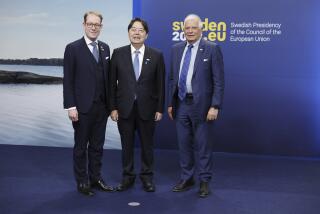Japan Must Be an Equal in Keeping Peace
- Share via
Thanks to the Japanese Parliament’s rescue measure, Prime Minister Ryutaro Hashimoto can assure President Clinton this week that U.S. Marines on Okinawa may legally remain on land on which some owners had refused to renew leases that expire May 14. But Japanese opinion, especially on Okinawa where 50% of U.S. troops reside, could still seriously undermine this vital bilateral relationship, if additional steps are not taken.
A majority of Japanese support the U.S-Japan alliance, but 70% want U.S. troops reduced. The Japanese especially question the need for 13,000 Marines on Okinawa. Defense Secretary William Cohen says they will stay there and that a force of about 100,000 will remain in East Asia “for the foreseeable future.”
Japanese rarely criticize the U.S. naval presence; they accept some U.S. air power, despite the noise, because they are watching China’s military growth--and the always-tense Korean peninsula. But few understand what Marines contribute to Japan or to stability in a region where the big news has been Asia’s rapid growth, not threats of war.
Some Japanese experts would move the Marines to Korea. Others suggest that they return to the U.S., with Japanese facilities mothballed in case they are suddenly needed again. But South Korea, now hosting 37,000 U.S. troops, would not welcome 13,000 more, especially since this would be seen by an already paranoid North Korea as close to an aggressive act. Furthermore, tying down the Marines to a single potential crisis would eliminate their strategic value on Okinawa, where they can jump in any direction.
Bringing them home has problems too. Remembering Bosnia, Somalia and Haiti, just how easy would it be to dispatch 13,000 Marines to Japan, short of war? How would potential troublemakers in East Asia interpret such a move? At what point would the U.S. military’s oft-hailed “contribution to regional stability” lose its credibility?
A U.S.-Japan agreement calls for Marines to withdraw from Futenma Air Station, moving helicopters to a floating landing strip off Okinawa and KC-130 tankers to Japan’s main island. Parachute drop training would be shifted to Iejima Island near Okinawa, the military port at Naha would be moved elsewhere in Okinawa and live artillery firing over an Okinawan highway would be shifted to Honshu and Hokkaido, if residents accept it.
These are substantial changes in response to Japanese pressures on a crowded island, 20% of which has been in U.S. military hands. But they may not be enough to prevent public unhappiness from damaging support for the security treaty itself.
The problem is on both sides. Without a Japanese counterpart, the Marines work independently, except for occasional joint exercises. Communication with other services could be better. In addition, more of their training could take place off-island, further reducing public aggravation. The Marines have one annual exercise in Thailand; some train every two months in Korea; recently they maneuvered in Australia. More regional training for a military force whose principal role is regional makes sense and could help other countries to join. It could include Guam and Palau’s Babelthuap Island. Hokkaido’s poorer and more sparse population might accept Marines, especially if they trained alongside Japanese troops and were seen as equally civic-minded “comrades in arms.”
The more the Japanese can visualize the Marines as serving U.S. and Japanese interests, the more likely they would be accepted. Such an image could be further enhanced by a new agreement to train together for disaster relief and for peacekeeping (Marines helped in the Kobe earthquake, aided Bangladesh in the 1992 floods and joined Russians in a disaster relief exercise last year in Vladivostok).
To dramatize that American and Japanese troops work closely together for the same goals and that Japan is a full and equally responsible participant in the alliance, Clinton and Hashimoto should declare that the force levels both countries maintain in Japan are based on their combined assessment of the regional situation. They should state that if the situation significantly improves, the two allies would take steps to reflect that new condition: in short, reduce U.S. force levels.
A true partnership--not only pledged by the two top leaders, but more widely appreciated at the grass roots--would ensure that this vital security relationship remains healthy.
More to Read
Sign up for Essential California
The most important California stories and recommendations in your inbox every morning.
You may occasionally receive promotional content from the Los Angeles Times.













